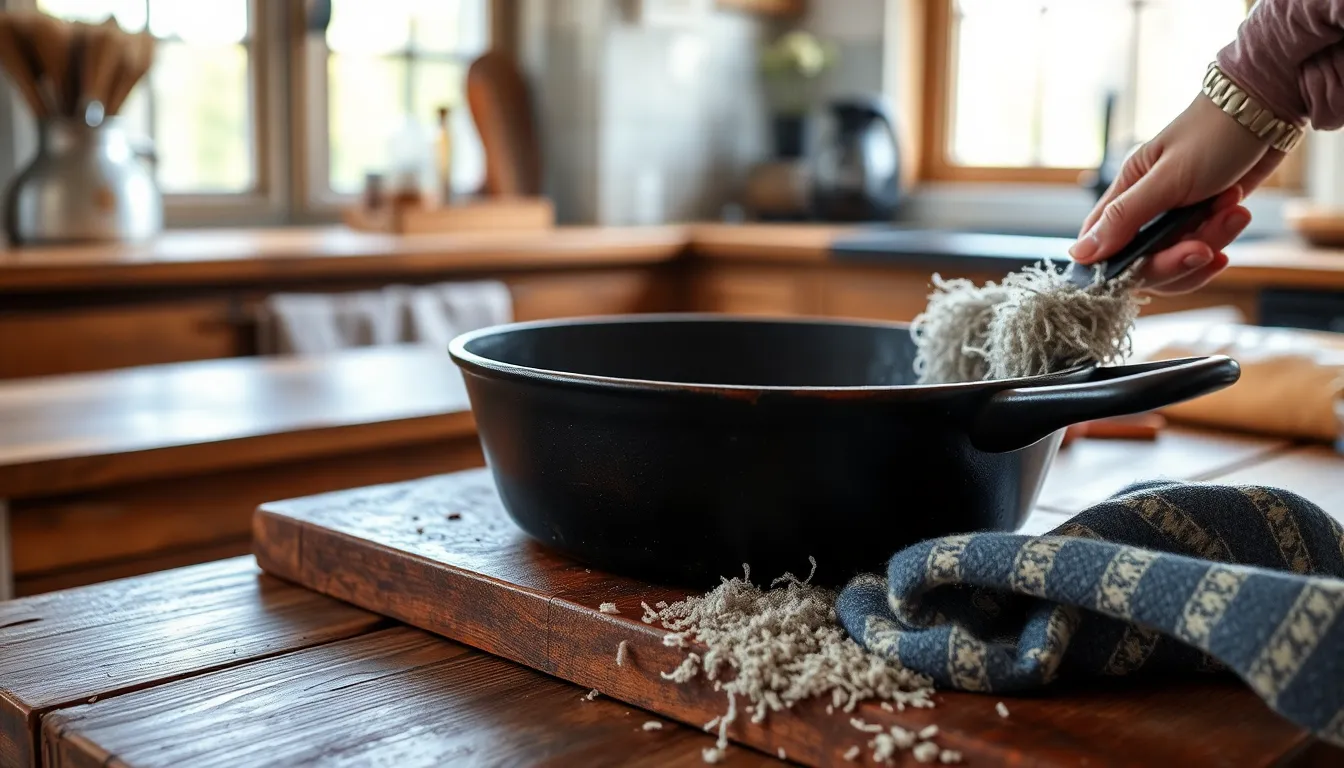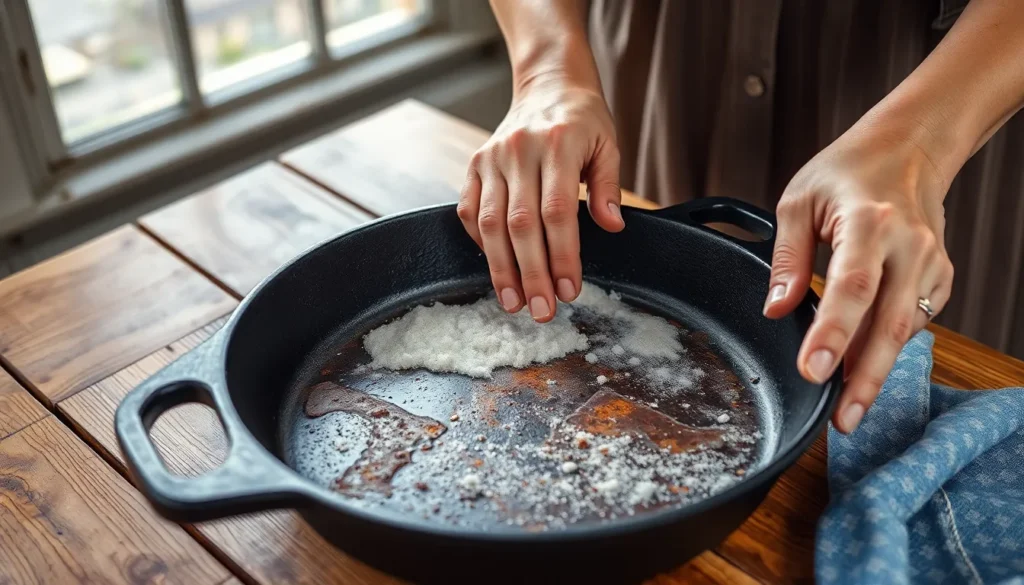Table of Contents
ToggleRust on cast iron can feel like a betrayal from your beloved cookware. After all, it’s been there through thick and thin—literally! But fear not, because cleaning rust off cast iron isn’t just a chore; it’s a chance to revive your kitchen’s unsung hero. With the right techniques, you can restore that well-loved skillet to its former glory, making it shine like the star it was meant to be.
Understanding Rust On Cast Iron
Rust appears on cast iron cookware due to exposure to moisture, air, and insufficient seasoning. Recognizing the causes and effects of rust is key to effectively restoring prized items.
Causes of Rust
Moisture exposure leads to rust formation. When cast iron sits damp, oxygen interacts with the metal, initiating oxidation. Prolonged contact with water, either from washing or condensation, exacerbates this issue. Inadequate seasoning also contributes. Seasoning creates a protective layer; without it, the bare metal is susceptible to rust. Additionally, improper storage in humid environments accelerates degradation. Environmental factors, such as salty air or climate variations, play significant roles as well. Knowing these causes helps in preventing rust and preserving cookware.
Effects of Rust on Cookware
Rust negatively impacts cookware performance. It affects food safety, as rust can flake off and contaminate meals. Cookware’s cooking surface becomes uneven, leading to poor heat distribution. Texture changes occur, with rough patches affecting seasoning adherence. Over time, rust can weaken the cast iron, causing structural integrity concerns. Even the aesthetic appeal diminishes, making once-prized items look neglected. Understanding these effects highlights the importance of regular maintenance and restoration.
Methods For Cleaning Rust Off Cast Iron

Cleaning rust off cast iron can rejuvenate old cookware and restore its usability. Various methods exist, catering to specific preferences or availability of materials.
Chemical Cleaners
Chemical cleaners effectively remove rust using formulated substances. Products like rust removers or phosphoric acid can dissolve rust quickly. Always read instructions carefully before use. Wearing gloves protects skin from strong chemicals. Apply the cleaner to rusted areas, allowing it to sit for the recommended time. Rinse thoroughly after cleaning to prevent residue from affecting future cooking.
Natural Remedies
Natural remedies offer safer alternatives for rust removal. Vinegar, for instance, contains acetic acid that can break down rust. Soaking the cast iron in vinegar for several hours can restore its surface. Baking soda mixed with water creates a paste effective in scrubbing off rust. Another option involves using lemon juice combined with salt, which acts as an abrasive cleaner. These methods are less harsh but may require more effort and time compared to chemical options.
Mechanical Methods
Mechanical methods utilize physical tools to remove rust. Steel wool or scrub brushes can effectively abrade rust from cast iron surfaces. Some may prefer using sandpaper, particularly on larger areas. Employing a power sander speeds up the process for extensive rust buildups. Always clean the surface afterward to eliminate rust particles. Following up with oil seasoning protects the cast iron from future rust development.
Prevention Tips For Rust Formation
Maintaining cast iron cookware is essential for minimizing rust formation. Employing proper techniques during seasoning and implementing effective storage solutions plays a significant role.
Proper Seasoning Techniques
Seasoning creates a protective layer on cast iron, preventing moisture penetration. Use high-smoke point oils like flaxseed, grapeseed, or canola to coat the surface. Apply a thin, even layer and heat the cookware upside down in the oven at 375°F for an hour. Repeat this process several times to build a durable non-stick surface. Regularly re-seasoning after cooking can reinforce this protective barrier. Always clean and dry the cookware thoroughly before applying oil.
Storage Solutions
Storing cast iron properly can also prevent rust. Keep it in a dry environment, avoiding damp areas of the kitchen. Use cotton cloths or paper towels to separate stacked pieces, ensuring airflow between them. A light coating of oil on the surface before storage can provide added protection. If possible, place the cookware in an oven or cabinet with low humidity. Regularly check for signs of moisture or rust, allowing for prompt action if needed.
Additional Care For Cast Iron Cookware
Maintaining cast iron cookware requires consistent effort to preserve its quality and functionality. Regular care enhances its cooking performance while preventing rust.
Routine Maintenance
Cleaning cast iron after each use helps retain its seasoning. Rinse with warm water immediately to remove food residues. Avoid soap since it can strip the seasoning. For stuck-on bits, use a gentle scrubbing pad or coarse salt for scrubbing. Thoroughly dry the cookware to prevent moisture from causing rust. After drying, apply a thin layer of oil to the cooking surface. Store in a dry area to keep the cookware protected.
Handling and Usage Tips
Using cast iron cookware properly extends its lifespan. Start with low to medium heat to prevent thermal shock. Preheating gradually allows even cooking and reduces sticking. Avoid using metal utensils, which can scratch the surface. Instead, opt for wooden or silicone tools. When cooking acidic foods, be cautious as these can affect the seasoning. Regularly inspect the cookware for any signs of wear or rust and address any issues immediately.
Restoring rusted cast iron cookware isn’t just about cleaning; it’s about reviving a piece of culinary history. With the right techniques and regular maintenance, anyone can ensure their beloved skillet remains a staple in the kitchen for years to come. By understanding the causes of rust and employing effective cleaning methods, cast iron can return to its former glory.
Emphasizing proper seasoning and storage will further protect against future rust issues. The care invested in maintaining cast iron not only enhances its functionality but also strengthens the emotional connection many have with these timeless kitchen tools. With diligence and a bit of effort, cast iron cookware can continue to provide delicious meals and cherished memories.




